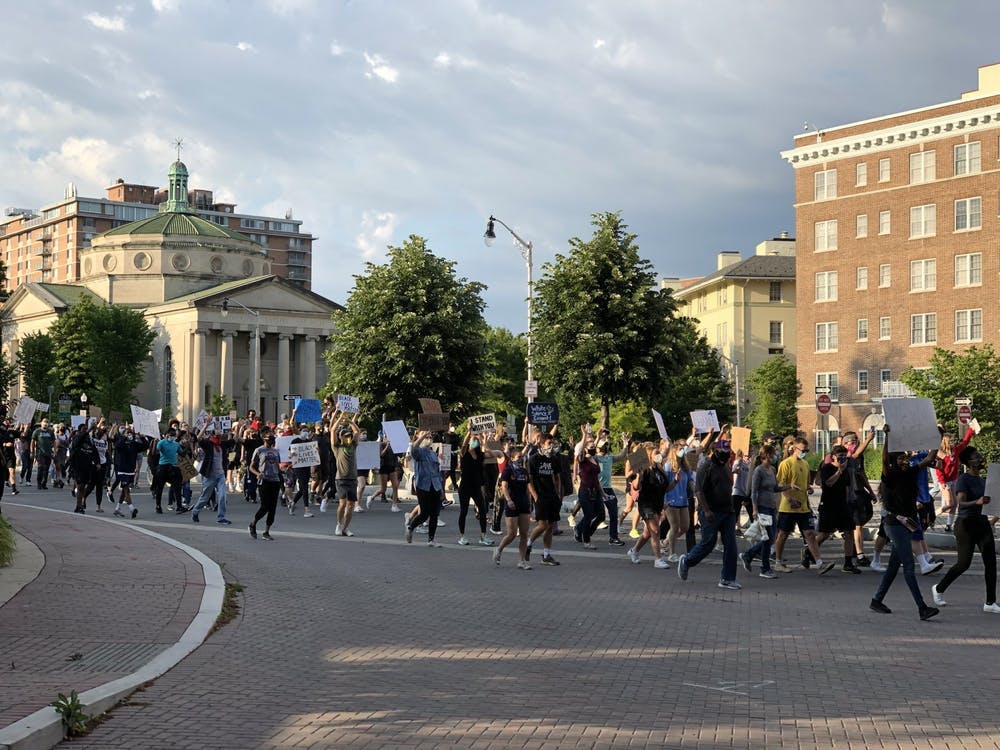George Floyd’s uncle Selwyn Jones and aunt Angela Harrelson discussed his death, police brutality and the Black Lives Matter (BLM) movement at an event hosted by Peabody Student Affairs on Dec. 3. Nyle Fort, a youth pastor and Master of Divinity candidate at Princeton Theological Seminary, moderated the talk.
Floyd was killed by a white police officer during his arrest in Minneapolis on May 25. His death led to nationwide protests against police brutality and systemic racism.
Harrelson recalled that she did not find out about Floyd’s death until the day after he died when a journalist called her seeking a statement. The news, she said, shocked her.
“My mind just went blank,” she said. “I was so confused, I was angry, I was mad, I was crying, I was in denial, I was everywhere.”
Jones reflected on the graphic video recording of Floyd’s murder.
“We were raised in a little town called Dillsboro, North Carolina, where I think me and my sister saw everything except a modern-day lynching,” he said. “We watched a 6-foot-7, 250-pound man perish and fade away in eight minutes and 46 seconds. Therefore, we feel like we’ve got to share this with people.”
Harrelson stated that Floyd’s endurance inspired her to become active in memorializing her nephew and speaking out against police brutality.
“If [Floyd] under those conditions could find the strength somehow to be willing to fight to live, and remember, he did this for eight minutes and 46 seconds, fighting to live... then I, who isn’t in those conditions, can go out and somehow be a voice. When I thought about those things, that gave me the strength — that gave me the courage — to do these talks,” she said. “A community came along, people he didn’t even know, a community that became my family.”
In the wake of Floyd’s death, protests arose in Minneapolis and spread to over 60 countries. An estimated 15 to 26 million people participated in protests in the U.S., making them the largest protests in the nation’s history.
Jones highlighted why Floyd’s death in particular catalyzed such a large-scale international response despite the prevalence of police brutality and several other notable deaths in recent years.
“Never before has anyone had the courage to stand there and videotape a lynching,” he said. “Darnella Frazier did that, so to me she is an angel because without her we would not be able to sit here and have this conversation... George had to die for the cause, but she made the cause.”
According to Harrelson, Floyd’s death occurring amid the COVID-19 pandemic was also essential to mobilizing large groups of people to protest.
“People were home whether they wanted to be or not, and they got a chance to see it,” she said. “People saw something that was inhumane that shocked them.”
Peabody junior Havalynn Robertson attended the event. She mentioned in an email to The News-Letter that she found it particularly moving that rather than focusing on the circumstances of his death, the discussion turned toward humanizing Floyd.
“Especially as a black individual myself I found this to be endearing because it’s exhausting seeing my people die at the hands of police brutality,” she wrote. “It was nice just to talk about him as a person and, though through tragedy, the legacy he has left on this earth.”
Harrelson advised attendees to avoid confrontation with those who oppose the goals of the movement against police brutality.
“There’s nothing you can really do about people that don’t want to hear you. It’s only when they have an open mind they want to hear you,” she said. “Don’t spend your energy trying to convince someone who is negative. Save your energy for the work you want to do to help the cause.”
Although protests over Floyd’s death have decreased in size and prevalence, BLM is still active in attempting to enact police brutality reforms and raise awareness of racial inequities in the United States.
Jones discussed the future outlook of the movement and how he felt about the movement arising as a result of an injustice done to his family.
“Everyone made a stand. We’re sick and tired of being sick and tired. If we keep this moving... If we can keep this conversation happening and keep educating people, then we’ll be in a good place,” he said. “I hate it to be proud, because my nephew had to perish for this, but it had to happen somewhere, sometime, and I’m glad it was my family member so I could change a lot of the things I had to deal with and endure in my life.”





